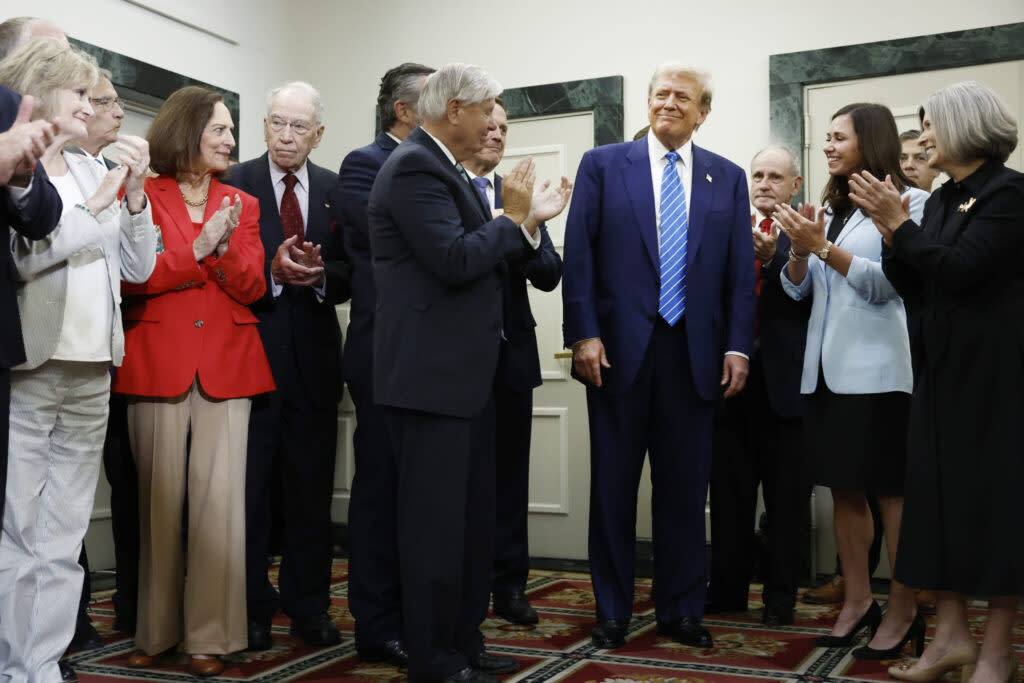Presidential immunity extends to some official acts, Supreme Court rules in Trump case

- Oops!Something went wrong.Please try again later.
Former President Donald Trump is applauded by U.S. Senate Republicans before giving remarks to the press at the National Republican Senatorial Committee headquarters on June 13, 2024. Trump, the presumptive GOP presidential nominee, visited Capitol Hill to meet with House and Senate Republicans. (Anna Moneymaker/Getty Images)
WASHINGTON — U.S. presidents enjoy full immunity from criminal charges for their official “core constitutional” acts, but no immunity for unofficial acts, the Supreme Court ruled Monday, sending former President Donald Trump’s case back to the lower courts.
The justices left open the question of how far official acts can reach, possibly reshaping the contours of the American presidency.
Trump escalated his immunity claim to the nation’s highest bench after two lower courts denied his request for protection from federal criminal charges alleging he schemed to overturn the 2020 presidential results.
The decision about the presumptive Republican presidential nominee’s actions while in office likely closes the door to any chance that Trump’s election subversion case could go to trial before Election Day.
The justices took up the case in February but did not hear oral arguments until April 25.
The trial court must now grapple with whether Trump’s alleged conduct to spread false information about the 2020 election results and conspiring to overturn them qualified as official presidential action.
In a 6-3 opinion, Chief Justice John G. Roberts Jr. wrote that the president is subject to criminal prosecution for unofficial acts, “like everyone else.”
“But unlike anyone else, the President is a branch of government, and the Constitution vests in him sweeping powers and duties,” Roberts wrote. “Accounting for that reality—and ensuring that the President may exercise those powers forcefully, as the Framers anticipated he would—does not place him above the law; it preserves the basic structure of the Constitution.”
The Supreme Court held that Trump’s conversations with Department of Justice officials regarding the election results were official but left unanswered questions about other conduct named in Department of Justice special counsel Jack’s Smith indictment of Trump.
“Certain allegations—such as those involving Trump’s discussions with the Acting Attorney General—are readily categorized in light of the nature of the President’s official relationship to the office held by that individual,” the opinion reads. “Other allegations— such as those involving Trump’s interactions with the Vice President, state officials, and certain private parties, and his comments to the general public—present more difficult questions.”
In a dissenting opinion, Justice Sonia Sotomayor wrote the decision makes the president “immune from criminal prosecution if he used the trappings of his office to violate criminal law.”
“If the occupant of that office misuses official power for personal gain, the criminal law that the rest of us must abide will not provide a backstop,” Sotomayor wrote. “With fear for our democracy, I dissent.”
Trump claimed in court filings that he could not be prosecuted for actions he took while still in office. His legal team also argues that former presidents cannot be tried in the court of law unless they are first impeached by the U.S. House and convicted by the Senate.
The indictment, which a federal grand jury handed up in August 2023, alleges Trump knowingly spread falsehoods to his supporters, plotting with co-conspirators to overturn results in seven states and eventually working his base into a frenzy that culminated in a violent attack on the U.S. Capitol on Jan. 6, 2021, the day Congress was to certify electoral votes.
DOJ’s Smith charged the former president with conspiracy to defraud the United States; conspiracy to obstruct an official proceeding; obstruction of, and attempt to obstruct, an official proceeding; and conspiracy against rights.
This is a developing story and will be updated.
The post Presidential immunity extends to some official acts, Supreme Court rules in Trump case appeared first on Kansas Reflector.

